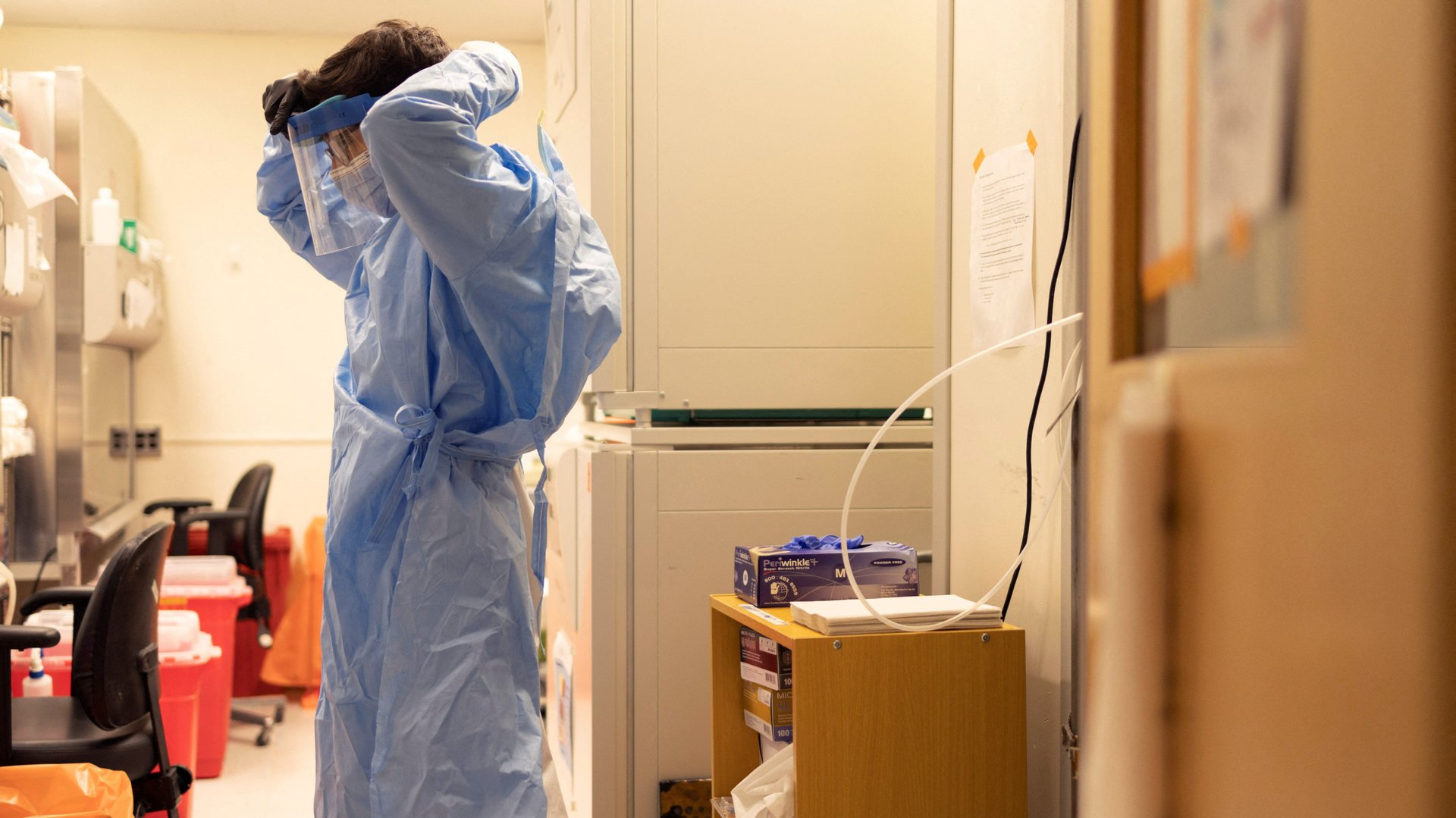What to expect from the pandemic in 2022
Just a few days into its third year, the covid-19 pandemic is setting new records.


Just a few days into its third year, the covid-19 pandemic is setting new records.
In Europe, daily cases had already soared well past their 2021 peak by late December, fueled by the omicron variant, and were growing exponentially in the US. Even in Canada, where strict restrictions had kept the virus in check, cases were shooting up. And that’s in places with relatively high vaccination rates.
Countries where a much smaller share of the population is fully vaccinated might soon see an explosion of cases.
It’s not yet clear whether the new onslaught will translate into the same level of death and hospitalization as previous waves. While omicron appears (for now) to be less lethal than delta, the blistering pace of its spread could result in more severely ill people. Regardless of what omicron’s epidemiological math turns out to be, whether the world will be facing another crisis come January 2023 will largely depend on policymakers.
The direction the pandemic takes in 2022 “is now subject to the degree of investment that rich nations put into mitigation of harm,” said Eric Reinhart, a medical anthropologist.
The virus
One certainty in 2022 is that SARS-CoV-2 will continue to mutate. Already, omicron has more mutations than previous variants, which appear to make it more efficient at infecting cells and evading antibodies.
If omicron were as transmissible as the delta variant, but better at evading immunity from vaccines or previous infections, it could result in around twice as many cases and hospitalizations in the US as during the peak in January 2021, according to an analysis (pdf) by the Covid-19 Modeling Consortium at University of Texas, Austin. The group predicts that would lead to slightly more deaths.
If, on the other hand, omicron spreads more quickly than delta, but has a harder time breaking through the body’s defenses, it would generate almost as many cases, but around half the hospitalizations and deaths.
The more cases there are, the more opportunities for the virus to mutate—for better or for worse. There is no guarantee that future mutations will gradually make the virus milder. “We’ll see other variants,” said Reinhart, who is also a physician at Northwestern University. “Some of them may evade testing, some of them may evade the vaccines, some may be more deadly.”
Vaccine protection
To stop the virus from mutating, rich countries will have to do a lot better in helping the rest of the world get jabbed.
In 2021, G7 and EU countries had a supply of more than 3 billion vaccines, according to data from the Covid Global Accountability Platform, a watchdog group out of Duke University. Assuming the countries vaccinated 75% of their population, boosted another 20%, donated some 400 million doses, and wasted 10% of their supplies, they would have around 770 million vaccines to spare. That’s more than were needed to meet the World Health Organization goal of covering 40% of the world’s population by the end of 2021. As of late December 98 countries were falling short of that goal.
Omicron will likely set global vaccination efforts further back. Early research suggests that two doses of an mRNA vaccine are far less effective against an omicron infection than they are against delta. A third shot is needed to increase protection. According to the models put together by UT Austin researchers, boosters could prevent hundreds of thousands of cases and tens of thousands of deaths if 80% of vaccinated Americans get them by March.
But while that might be attainable in the US, it looks well out of reach for poor countries where residents are yet to receive their first dose.
The response
Though each variant is different, after two years of living with the virus we know enough to control it, researchers say. At the top of public health experts’ wish list for politicians is upping vaccine distribution around the world, though masking, social distancing, and widespread testing are also needed. “The challenge before us today isn’t a scientific problem,” said Akshita Siddula, co-founder of Right to Health Action, an advocacy group, during a recent online conference. “What we have here in front of us is a problem of politics and power.”
In 2022, governments will most likely have an additional pandemic-fighting tool: new covid antiviral drugs that promise to prevent the worst of the virus’s effects. Whether the pills put a dent in the pandemic will also depend on how policymakers in the world’s most powerful countries allocate supplies. Pfizer and Merck have already inked licensing agreements with poor regions so factories there can manufacture the drugs, according to data compiled by Covid GAP. But the drugs Merck and Pfizer produce themselves will likely go to rich countries first, based on the supply deals they’ve already signed.
A huge global wave of omicron cases, which some experts are expecting, might stave off the pandemic for some time. Early research suggests an omicron infection boosts immunity to the delta variant, which could be displaced. And populations are likely to quickly build up immunity to omicron itself, given how fast it spreads and how many it could infect.
Still, to avoid bumbling from variant to variant in 2022, policymakers will have to change their approach from containment to prevention, and from local to global. That’s not only needed to get this virus under control, but to do better when the next one hits. “It’s not going to be long before we’re facing down another pandemic,” said Siddula. “Covid the sequel.”